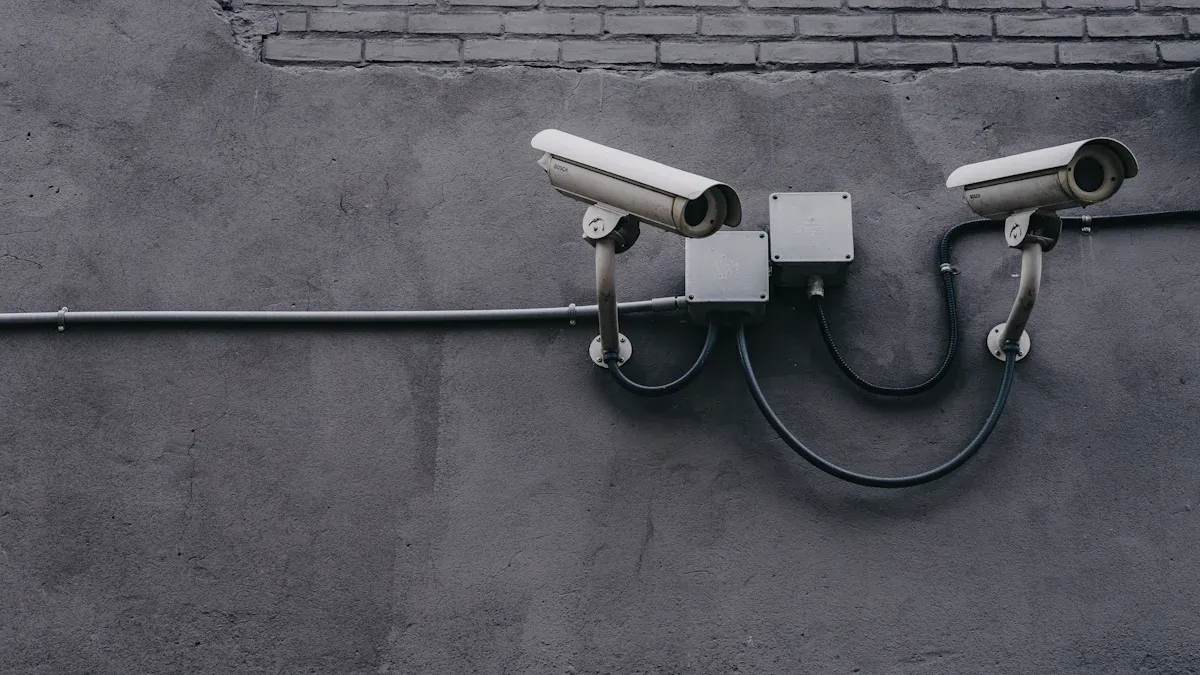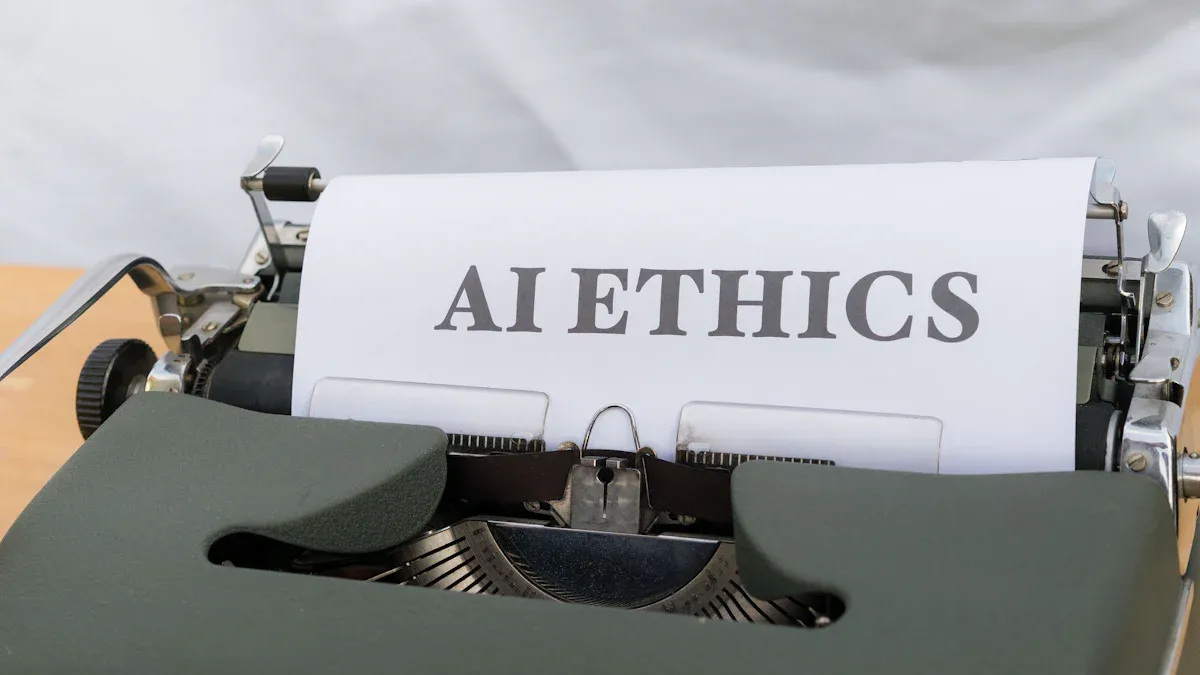What Shoppers Need to Know About the Ethics of AI Surveillance

Imagine you go into your favorite store and see cameras watching you. You might wonder who looks at your data and what they do with it. Many shoppers have these worries:
42% do not like ads made just for them.
48% want better service, not choices made by machines.
Learning about the ethics of ai helps you keep your privacy and freedom safe.
Key Takeaways
Know your rights: You should know how stores use AI surveillance. You should also know what data they collect. Always check for privacy notices.
Ask questions: If you are not sure about your data, ask store workers. Ask them to explain things clearly. Your comfort is important.
Make good choices: Shop at stores that respect your privacy. Pick stores that use ethical AI practices. Your choices help stores treat customers better.
AI Video Surveillance in Stores

How AI in Monitoring Works
When you enter a store, you may see cameras and screens. These are part of ai video surveillance. Surveillance systems use special cameras to get clear pictures of shoppers and items. Some stores have cameras that can move and zoom in on different spots. Microphones might pick up sounds to help staff understand what is happening. Video recorders save all the footage, and monitors let workers watch live or old videos. Ai in monitoring uses computer vision to study what happens right away. Video surveillance ai can notice strange actions, follow people, and send alerts to security teams. Facial recognition software sometimes helps find people who caused problems before. Heat mapping technology shows where shoppers spend the most time. These surveillance systems often link with other store systems, like doors or checkout counters.
Surveillance systems collect many kinds of data. They track which items you look at or touch. They guess your age and gender for marketing. They also make heatmaps to show how people move in the store. Ai video surveillance uses machine learning to study this data and help stores learn about customer behavior.
Common Uses in Retail
Stores use ai video surveillance for many reasons. Loss prevention is a big reason. Surveillance systems can spot shoplifting by watching for certain moves or actions. They send alerts to security if they see something odd. Ai-enabled security systems help workers by letting them watch less often. These systems also make reports about theft patterns. Ai video surveillance helps stores handle shrinkage and organized retail crime. Surveillance also helps customer service by showing which areas get busy. Ai-enabled security systems help stores work well and keep shoppers safe.
Tip: You can ask store workers how their surveillance systems work and what data they collect.
Ethics of AI and Customer Privacy

Privacy Concerns
You give stores your personal data when you enter. AI video surveillance collects details about what you do, your face, and sometimes your voice. Many shoppers worry about how stores use this data. People feel more concerned when they do not know what happens to their information. Consumer groups point out three main problems:
Privacy Concern | Description |
|---|---|
Consent | Stores must ask you before they collect your data. |
Data Transparency | You should know how stores collect and use your data. |
Biometric Data Ethics | Collecting facial recognition data brings up big questions. |
Most people feel worried about ai surveillance. Surveys show 81% think companies will use their data wrongly. About 80% worry about privacy online. Nearly half feel they cannot protect their personal data. These numbers show why ethics in ai matter. You can ask stores how they use your personal data. Some ai video surveillance systems blur faces or hide details. These steps help keep your privacy safe. Stores must follow laws like GDPR and CCPA. These laws stop stores from keeping or misusing sensitive data. When stores respect your privacy, you can trust them more.
Fairness and Bias
Fairness is important in the ethics of ai. AI video surveillance should treat everyone the same. But ai can make mistakes. Sometimes, the technology does not work well for all groups. For example, facial recognition systems make more mistakes for Asian, African American, and Native American faces. These mistakes can happen much more than for Caucasian faces. Behavior detection tools can also get actions wrong because of culture. This can cause unfair treatment.
AI video surveillance can be biased if trained on unfair data.
Some algorithms may only suggest products for certain groups.
AI-driven pricing can charge some people more or leave them out.
Mechanism of Discrimination | Description |
|---|---|
Biased Training Data | AI may favor some groups and give unfair recommendations. |
Unintended Discrimination | AI may miss the needs of some shoppers. |
Algorithmic Stereotypes | AI can repeat old mistakes if trained on bad data. |
Biased data in ai surveillance can hurt minority shoppers. For example, a store’s ai might only show styles for one group. Others may not get any suggestions. This is why ethics are important. You should get fair treatment. Stores need to check for bias and fix problems fast.
Transparency in AI
Transparency in ai helps you know what happens to your data. You should know when ai video surveillance is watching and how it works. Privacy experts say stores should do these things:
Tell you clearly how ai tracks your shopping.
Explain how your information will be used.
Get ready for new rules that protect your privacy.
Note: "Retailers can build trust or doubt with AI. Taking time to build trust is better than rushing and causing doubt."
Stores should make their rules easy to find and read. You should see signs or get info about ai video surveillance when you enter. This helps you make smart choices. Accountability means stores must answer your questions and listen to you. If you do not want your data used, you should be able to say no. Ethical ai surveillance puts your rights first.
Ethical problems in ai often happen because rules are not clear. Fairness, transparency, and consent are important for ethical ai video surveillance. When stores follow these rules, they keep your privacy safe and earn your trust. You help by asking questions and expecting stores to be responsible. The effect of ai surveillance depends on how well stores follow these rules.
Shoppers' Rights and Choices
Understanding Store Policies
You should know how stores use AI surveillance. Stores must follow laws that protect your information. Look for signs or notices when you walk in. These signs tell you how your data is used. Stores must share privacy policies with shoppers. These policies say how long they keep your data and why. If you do not see these policies, ask a worker.
Here is what you should find in a store’s AI surveillance policy:
Component | Description |
|---|---|
Data Privacy and Security | Stores say how they collect and use your information. They explain how they keep your data safe. They use steps like anonymization and follow privacy rules. |
Legal Compliance | Stores show how their rules match laws and standards. They include rules for privacy and customer protection. |
Read these policies before you shop. This helps you make smart choices and builds trust.
Tip: If you do not understand a store’s policy, ask a worker for help. You have the right to clear answers.
Consent and Data Use
You decide if stores can use your data. Stores must ask before using face recognition or other personal details. Your face should not be scanned without your knowledge. Experts say stores need good rules for face recognition to protect privacy.
Stores use different ways to get your consent and handle your data:
Practice | Description |
|---|---|
Signage | Stores put up signs about surveillance. Signs give contact info for privacy questions. |
Staff Training | Workers learn to respect your privacy and answer questions. |
Technology Monitoring | Cameras are set up to avoid extra personal information. |
Ongoing Evaluation | Stores check if surveillance helps safety without hurting your rights. |
You can choose to give or not give consent. If you do not want your data used, ask the store to remove it. You should know how stores collect and use your data. They gather photos and videos, mark items, and train AI models. Stores use these models for real-time detection and recognition.
Note: Always look for signs or ask staff about how your data is used. Your choices matter for trust.
Protecting Your Privacy
You can take steps to keep your privacy safe. Stores must only collect the data they need for safety. Automated rules delete surveillance data after a set time. Real-time processing helps stores spot threats fast. Privacy checks help stores fix problems with customer privacy.
Here are ways you can protect yourself:
Read privacy notices before you shop.
Ask how long your data will be kept.
Request your data be deleted if you do not want it stored.
Look for stores that use privacy-friendly technology, like face blurring.
Choose stores that respect privacy and protect your data.
You help balance safety and privacy by staying informed. Surveillance helps stop crime and keeps stores safe. Many shoppers say they will share some data for better security or deals. In the United States, most people want to stop fraud and keep public safety, even if it means sharing some information. You should decide what feels right for you.
Callout: You have the right to ask questions and expect honest answers. Your privacy matters as much as safety.
Stores must balance keeping you safe and respecting your privacy. Surveillance can stop crime and help stores work better, but it should not go too far. You should expect stores to check their policies often and follow laws that protect your rights. When stores respect privacy, they earn trust and keep shoppers coming back.
AI surveillance in stores brings up big ethical issues. These issues are about consent, bias, and transparency. They also include data collection and privacy laws.
You should read privacy notices every time you shop.
Ask questions if you do not understand something.
Expect stores to have clear rules and give honest answers.
Learn as much as you can and ask for fair AI practices in stores.
FAQ
What should you do if you feel uncomfortable with AI cameras in a store?
You can ask a worker about the cameras. You may also request information about how the store uses your data.
Can you refuse to let a store use your personal data?
Yes. You have the right to say no. You can ask the store to delete your data or not collect it.
How do you know if a store uses AI surveillance?
Look for signs at the entrance. Stores often post notices about cameras and data collection. You can also ask staff for details.
See Also
Understanding AI-Driven Convenience Stores: Essential Insights for Retailers
The Future of Retail: Embracing AI-Enhanced Store Experiences
The Dangers of Vending Machines: Important Safety Considerations
Upcoming Changes to Walmart Self-Checkout Systems by 2025
Walgreens Self-Checkout: Balancing Convenience With Retail Challenges
